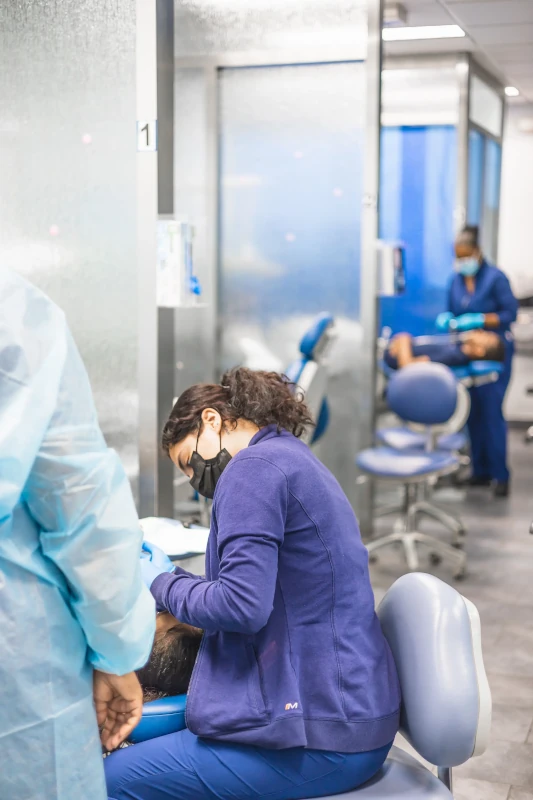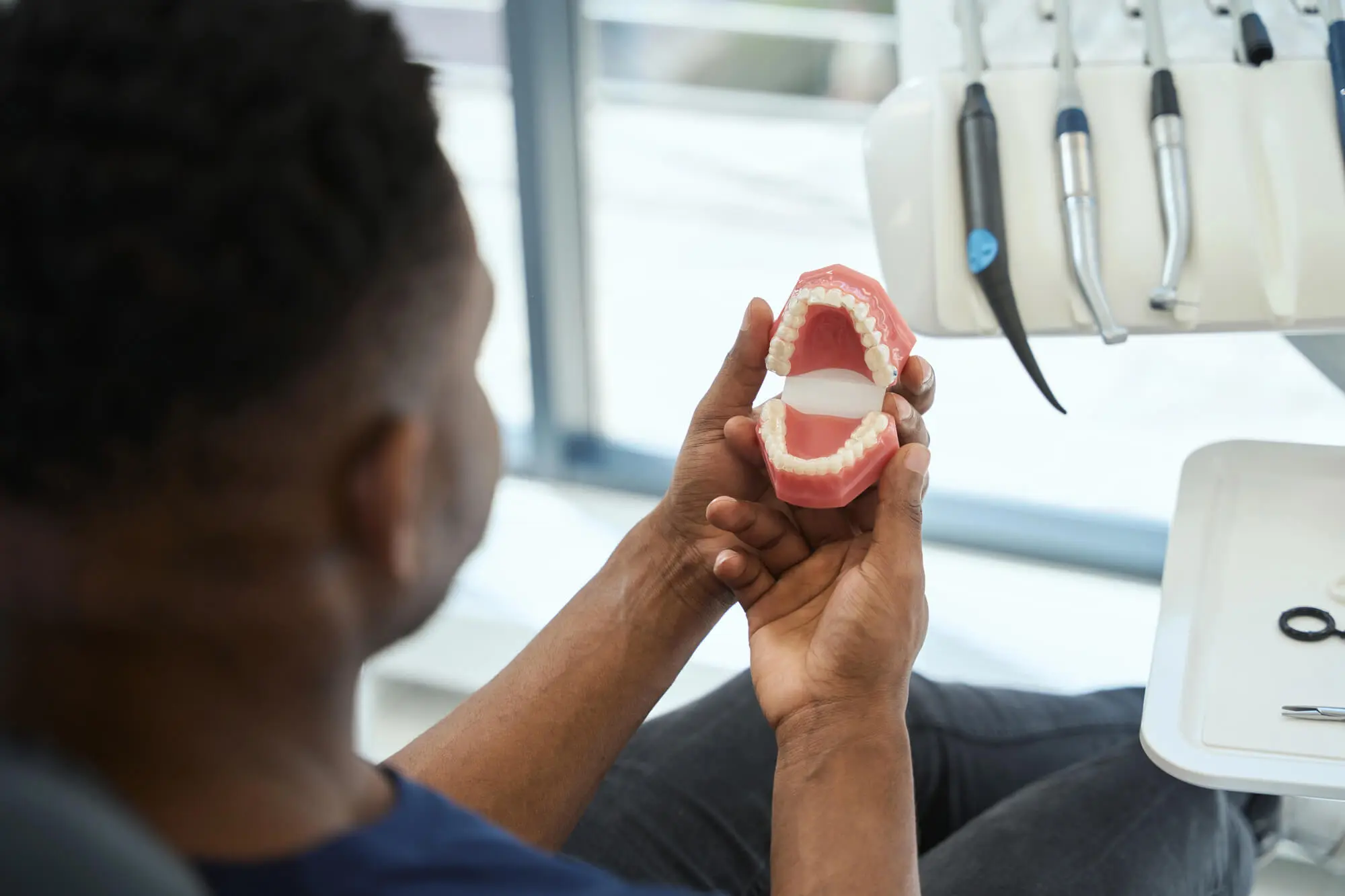Post
How Dentures Affect Speech—And What You Can Do About It
Dentures in Dyckman can be a life-changing solution for patients with severe tooth loss. Unlike dental implants, dentures are simple, affordable, and accessible. While they require some time to get used to, you’ll soon be back to enjoying all your favorite foods. With the right practice, speaking clearly and confidently will become second nature.
Speaking with dentures can be particularly challenging, especially in the first few days after getting them. However, there are some things you can do to speed up this process!

Teeth and Speech: Two Inseparable Factors
Speech is produced through a collaborative effort of the tongue, lips, palate, vocal cords, and teeth. While the vocal cords create sound, the articulators—which include the teeth—shape it into recognizable speech.
For example, to pronounce the "f" sound, the bottom lip touches the upper front teeth. For "s" and "z," the tongue is close to the upper teeth. Without proper tooth structure, these sounds can become muffled or distorted. When teeth are missing or replaced by dentures for the first time, speech can be affected in a variety of ways, including:
Difficulty Pronouncing Certain Sounds
Dentures can alter the placement of the tongue and lips, making it difficult to pronounce certain sounds correctly.
Slurred Speech
Ill-fitting dentures or improper alignment can cause slurred speech or mumbling.
Whistling or Clicking Sounds
Poorly fitting dentures can produce whistling or clicking sounds during speech, reducing clarity.
Changes in Tongue Movement and Space
Dentures (particularly ones that cover the palate) may feel crowded on the tongue, disrupting normal movement and articulation. The brain also requires time to retrain speech patterns based on the new shape of the oral cavity.
Excess Saliva
New dentures frequently increase saliva flow, which can make speaking difficult or cause slurring until the body adjusts.

7 Tips to Improve Speech with Dentures
Getting used to dentures can take time, particularly when it comes to speaking clearly and confidently. Many new denture wearers experience temporary speech changes, such as lisping, mumbling, or difficulty pronouncing specific words. This is perfectly normal.
Dentures create new structures in the mouth, and your tongue and muscles need some time to adjust. The good news is that you can significantly improve your speaking skills with some patience and practice. Here are seven effective tips for speaking more naturally and clearly with dentures:
1. Read Aloud Daily
One of the most effective ways to train your mouth and tongue to adapt to dentures is through repetition. Reading aloud allows you to practice forming words and sounds while becoming accustomed to the feel of your dentures. Choose books, newspapers, or song lyrics and read aloud for 10-15 minutes daily.
Concentrate on tricky consonants such as "s," "f," "v," "t," and "th." These sounds are frequently impacted the most because they require precise tongue and teeth placement. Over time, your muscles will remember and pronounce the new movements correctly.
2. Speak Slowly and Clearly
It is common to slur words or stumble over sounds while adjusting to dentures. Speaking slowly and deliberately gives you more control and helps to avoid mistakes. Focus on clearly pronouncing each word, especially when speaking in public or on the phone.
Fast speech tends to exaggerate minor pronunciation issues. By slowing down, you'll sound clearer and feel more in control and confident.
3. Use a Mirror for Practice
Practice in front of a mirror to see how your mouth moves while speaking. This visual feedback can help you improve your tongue and lip placement awareness, and watching your mouth move also helps train your brain to make faster adjustments.
You can also smile and notice how your dentures look while speaking, allowing you to see and feel confident in your new smile’s look.
4. Try Denture Adhesives for Stability
Denture movement is a common speech-related issue. If your dentures move while you speak, certain sounds may become difficult to pronounce, and clicking noises may occur. A good denture adhesive can help keep your prosthesis securely in place, allowing you to talk without distractions.
5. Start with Simple Conversations
When practicing conversations, start with short, simple dialogues. Talk to yourself, a family member, or a friend in simple sentences. This allows you to practice without the pressure of a formal environment.
You can also record voice memos on your phone and listen to how they sound. This will help you track your progress and identify specific sounds that need improvement.
6. Stay Hydrated and Manage Saliva
New dentures can temporarily increase saliva production, affecting speech clarity and comfort. Luckily, there’s a simple solution to that: drinking more water. Staying hydrated makes saliva thinner, so it’s easier to swallow. This also reduces the sensation of excessive moisture in the mouth.
If you notice excessive dryness or drooling, contact your dentist. We can suggest oral rinses or techniques for balancing saliva flow during adjustment.
7. Don’t Hesitate to Ask for Adjustments
If you've been wearing your dentures for a few weeks and still have trouble speaking clearly, the fit might need to be adjusted. Dentures that are too loose or too tight can interfere with proper tongue movement and lead to ongoing speech difficulties.
Make sure to schedule a follow-up appointment with your dentist a few weeks after getting your final denture restoration. During this time, we can check for pressure spots, improper fit, or other issues affecting your speaking ability. Sometimes, even a small adjustment can make a big difference.

Practice Speaking with Dentures in Dyckman and Make the Most Out of Your New Smile
Speech issues like difficulty pronouncing specific words or changes in speech patterns are common among people who wear dentures. These challenges can impact your confidence and daily interactions, but they're only temporary.
Everyone adjusts to speaking with dentures differently. While some people adapt quickly in a few weeks, others may need more time and practice to feel confident in their speech. With consistency and the help of your dentist at Perfect Smile Doc, you’ll get used to wearing dentures in no time. Give us a call, and let’s work out any problem together!
Not Sure if You’re Covered?
Your Perfect Smile is within reach, and we're here to help you every step of the way. We can streamline the process for you by contacting your insurance company and acquiring a detailed breakdown of your specific plan information. Let us take the guesswork out of navigating insurance and payment options.
Learn More

555 E FORDHAM RD BRONX, NY 10458
MONDAY TO FRIDAY 9:00 AM – 6:00 PM
SATURDAY 8:00 AM – 2:30 PM
B
D
4
Bx12
Bx12+
Bx9
Bx15
Bx17
Bx22
Bx41
Bx34 B Bx1
Bx2
BxM4

468 E FORDHAM RD BRONX, NY 10458
MONDAY TO FRIDAY 9:00 AM – 6:00 PM
SATURDAY 8:00 AM – 2:30 PM
B
D
4
Bx12
Bx12+
Bx9
Bx15
Bx17
Bx22
Bx41
Bx34
Bx1
Bx2
BxM4

192 Dyckman St New York, NY 10040
MONDAY TO FRIDAY 9:00 AM – 6:00 PM
SATURDAY 8:00 AM – 2:30 PM
A
1
M100
Bx7
BxM1
Bx12
Bx12-SBS
Bx20
M3




